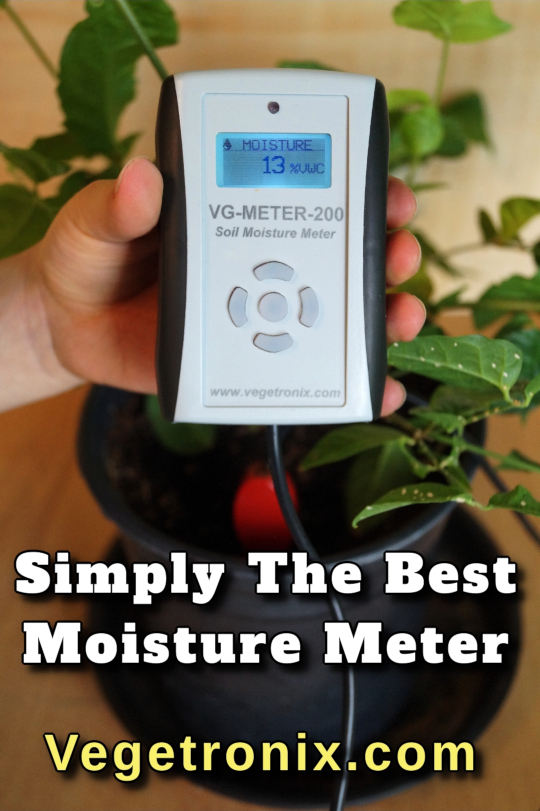The Truth About Cheap Chinese Moisture Meters – Why You Should Avoid Them
By Tim the Techno-Gardener
I often get asked by my customers, “Tim, shouldn’t I just get a $10 Chinese moisture meter off Amazon?” Today, I’m going to show you five reasons why cheap moisture meters are a complete waste of money and why they may actually be harming your plants.
Reason 1: Cheap Moisture Meters Corrode and Self-Destruct
Most cheap moisture probes are made of metal, which means they will corrode over time. In fact, many of these devices come with warnings on the packaging that acknowledge this flaw. These types of sensors are known as galvanometric sensors, which means they essentially act like a small battery. If your moisture meter doesn’t require batteries, chances are it works this way.
Think about what happens when a battery leaks inside a flashlight—the acid corrodes everything. The same thing happens inside the soil with these moisture meters. The two metal probes act as electrodes, and the soil acts as an electrolyte, triggering a reaction that slowly eats away at the metal. In other words, these meters are designed to self-destruct through normal use.
By contrast, the VG-METER-200 uses a dielectric-based sensor that measures the properties of water rather than relying on metal probes. It’s constructed with fiberglass, meaning it won’t corrode over time. Our sensors are used in irrigation systems and can be buried for years without any loss in functionality.
Cheap Moisture Meters Are Highly Inaccurate
Let’s be honest—many of these cheap meters are incredibly inaccurate. In fact, some of their own packaging even admits this! To demonstrate, I tested a cheap moisture meter in pure water, where you’d expect it to read at 100% moisture and the results were laughable.
On the other hand, the VG-METER-200 correctly detects the moisture level in pure water, providing accurate and reliable readings every time.
Reason 3: Cheap Moisture Meters Are Affected by Salt and Minerals
Because these meters operate like small batteries, they don’t actually measure moisture, they essentially measure the presence of electrolyte . This means that salts, fertilizers, and other minerals can interfere with the readings, making them even less reliable.
To test this, I measured moisture levels in pure water and then added salt. As expected, the cheap meter gave wildly different readings. But the VG-METER-200, which senses water content rather than electrical conductivity, remained completely unaffected by the presence of salt.
Reason 4: Cheap Moisture Meters Shock Your Plant Roots
Here’s something many people don’t realize: every time you insert a cheap moisture meter into the soil, an electric current runs between the probes. If plant roots are nearby, they could get zapped with the electric current.
Plants generate and respond to bioelectric signals, which help guide their growth. Using a cheap moisture meter risks damaging your plant’s delicate root system, harming their health and development.
To prove that the VG-METER-200 doesn’t send electricity into the soil, I conducted an experiment. Since the human body is mostly water, I grabbed the sensor with rubber gloves to see if it could detect moisture through my hands. Since rubber is an insulator, the sensor should only respond to actual water—and it did! This proves that the VG-METER-200 does not rely on electricity to detect moisture.
Reason 5: Buying Cheap Moisture Meters Supports the Chinese Government
Every dollar spent on these cheap Chinese moisture meters ultimately benefits the Chinese Communist Party (CCP). China imposes taxes on exports, which means your purchase is indirectly funding their government. Instead of supporting foreign economies, we should choose products that promote Western democracy, create jobs, and strengthen our manufacturing base.
The Best Alternative: The VG-METER-200
To summarize, if you want a moisture meter that:
- ✔ Doesn’t corrode like a leaky battery
- ✔ Provides highly accurate readings
- ✔ Is not affected by salt or fertilizers
- ✔ Doesn’t electrocute plant roots
- ✔ Supports American manufacturing
Then consider the VG-METER-200—a highly accurate, salt-insensitive, professional-grade moisture meter made in the USA.
Here is a link to the VG-METER-200 used in the video
Contact me if you have any questions on the VG-METER-200.
